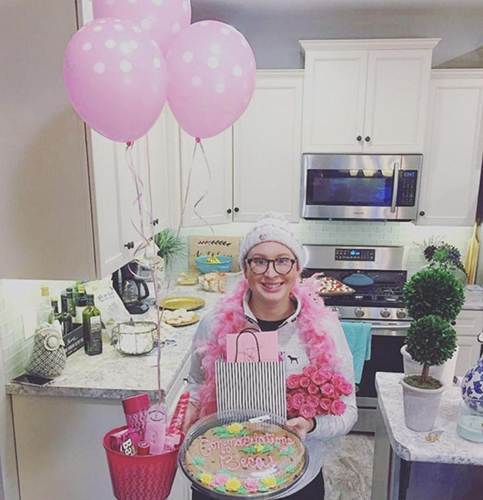At 28 years old, Rebecca felt strong and healthy. She had no reason to be concerned about breast cancer. But when she got out of the shower one Monday morning and noticed a dimple in her right breast that looked similar to cellulite, she called her gynecologist right away.
On Tuesday, she had a biopsy, and by Wednesday, she had the results – it was cancer.
All about the details
"I work right next to the clinic, so I went over right away and was like, ‘Give me the details. What does this mean?" says Rebecca, recalling her reaction upon hearing the diagnosis. "My nurse navigator walked me through all the terminology."
As a level-headed individual who rarely cries, Rebecca was in shock nonetheless. How could she have breast cancer at just 28 years old?
Fortunately, as Rebecca was coming up on a week of a stay-at-home vacation, she was able to fit in several necessary doctor appointments. Just 9 days after her diagnosis, she had a lumpectomy to remove the tumor.
"My doctors understood that I like information and didn't try to sidestep any of it," Rebecca says. "After each appointment, they would give me all the handouts with all the technical terms so I could go home and do the research on it."
After her lumpectomy, Rebecca underwent chemotherapy for about 6 months.
"When you go through all of that, you're just like, ‘Let's just get through today, and then I'll worry about tomorrow,'" explains Rebecca. "That's how I kind of am with everything."
A 28-year-old with breast cancer… but why?
Though not unheard of, a young woman developing breast cancer is still somewhat of a phenomenon.
"The doctors wanted to know why a 28-year-old woman with no family history got breast cancer, so they did gene testing and checked for eight different gene mutations," Rebecca says.
The test revealed that Rebecca carries the CHEK2 gene mutation, which makes individuals more likely to develop certain types of cancer, including a moderate risk of breast cancer. This gene is passed down from either the mother or father, giving the child a 50 percent chance of having it as well.
Talking about breast cancer
Just like with any other type of cancer, it can be difficult to talk about. Rebecca tries to reach out to people when she finds out they have cancer to see if there is anything she can do to help.
"After something bad happening, I want something good to come from it," says Rebecca. "If I can help as many people as possible, that's very important to me. I owe it to my peers to help if I can, because I've been there."
Rebecca discovered her breast cancer because she performed a self-exam.
"I never thought in a thousand years I'd have breast cancer," Rebecca admits. "I'm walking proof how important it is to listen to your body, to have a doctor you are in contact with and are comfortable going to. It's so important to go and get screened."
